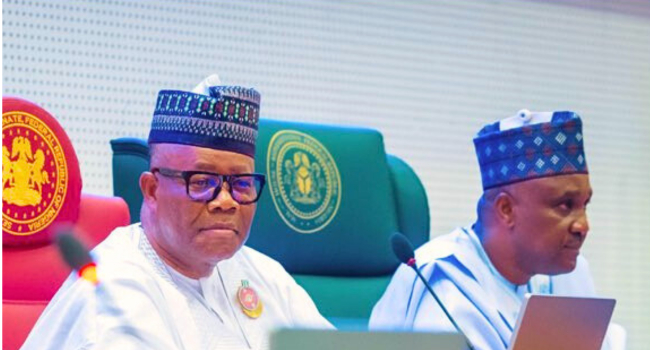Nigeria
SERAP Takes Akpabio, Abbas to Court Over Lawmaker ‘Running Costs

SERAP initiates legal action against Akpabio and Abbas for setting ‘running costs’ for lawmakers, raising questions about transparency and accountability.
SERAP has taken legal action against the leaders of the National Assembly for setting a running cost for lawmakers, citing socio-economic rights and accountability concerns.
The Senate President, Godswill Akpabio and Speaker of the House of Representatives, Tajudeen Abbas were also part of the lawsuit.
According to the group, the duo was unsuccessful in stopping “the illegal action of National Assembly related to setting their own allowances and expenses, as well as not providing an explanation for monthly running costs paid to its members.”
SERAP’s Deputy Director, Kolawole Oluwadare revealed on Friday that the lawsuit had been filed at the Federal High Court in Abuja a week before.
According to him, former President Olusegun Obasanjo recently alleged that the legislators set their salaries and allowances in opposition to the suggestions of RMAFC.
READ ALSO: SERAP Urges Tinubu to Investigate $1.5bn World Bank Loan to States and $3bn Chinese Loan
The group is requesting for a mandamus order to be issued, which will require Mr. Akpabio and Mr. Abbas to put an end to the illegal practice of National Assembly members setting their own pay and benefits referred as “running cost”.
The petition is also seeking a “mandamus order” to enforce disclosure by Mr. Akpabio and Mr. Abbas of the precise sum disbursed & received for monthly running expenses, as well as any particulars pertaining to such expenditures.
In light of the statement, SERAP is requesting a mandamus order to force Mr. Akpabio and Mr. Abbas to cease their purported actions of depositing payments labeled as “running costs” into legislators’ personal bank accounts.
According to Oluwadare, fixing the salaries, allowances and running costs of the National Assembly is clearly prohibited by paragraph N, section 32(d) of the Third Schedule to the Nigerian Constitution 1999 [as amended].
Paying running expenses into the private bank accounts of lawmakers is believed to be a violation of Rule 713 in the Federal Government Financial Regulations that clearly states, “public funds must not be deposited into personal bank accounts.”
